
Bhutan's early history is steeped in mythology and remains obscure. Some of the structures provide evidence that the region has been settled as early as 2000 BC. According to a legend it was ruled by a Cooch-Behar king, Sangaldip, around the 7th century BC, but not much is known prior to the introduction of Tibetan Buddhism in the 9th century, when turmoil in Tibet forced many monks to flee to Bhutan. In the 12th century, the Drukpa Kagyupa school was established and remains the dominant form of Buddhism in Bhutan today. The country's political history is intimately tied to its religious history and relations among the various monastic schools and monasteries.

Jigme Singye Wangchuck is a member of the House of Wangchuck who was the king of Bhutan from 1972 until his abdication in 2006. During his reign, he advocated the use of a Gross National Happiness index to measure the well-being of citizens rather than Gross domestic product.
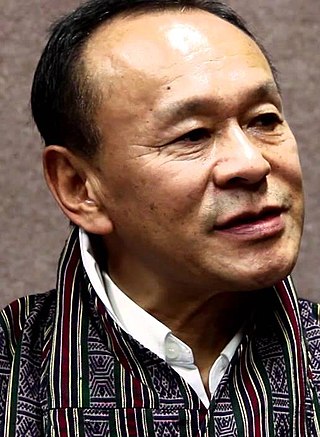
Lyonpo Jigme Yoser Thinley is a Bhutanese politician who was Prime Minister of Bhutan from 20 July 1998 to 9 July 1999, 30 August 2003 to 18 August 2004 and 9 April 2008 to 28 April 2013.

The national flag of Bhutan is one of the national symbols of Bhutan. The flag features a Chinese dragon from Bhutanese mythology. This alludes to the Dzongkha name of Bhutan – Druk Yul – as well as the Drukpa Lineage of Tibetan Buddhism, which is the dominant religion of Bhutan.

Jigme Dorji Wangchuck was the 3rd Druk Gyalpo of Bhutan.

Gross National Happiness, sometimes called Gross Domestic Happiness (GDH), is a philosophy that guides the government of Bhutan. It includes an index which is used to measure the collective happiness and well-being of a population. Gross National Happiness Index is instituted as the goal of the government of Bhutan in the Constitution of Bhutan, enacted on 18 July 2008.
Articles related to Bhutan include:

Gongsar Ugyen Wangchuck was the first Druk Gyalpo (King) of Bhutan from 1907 to 1926. In his lifetime, he made efforts to unite the fledgling country and gain the trust of the people.
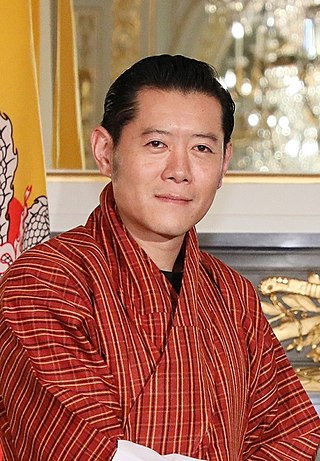
Jigme Khesar Namgyel Wangchuck is the Druk Gyalpo, the monarch of the Kingdom of Bhutan. After his father Jigme Singye Wangchuck abdicated the throne, he became the monarch on 9 December 2006. A public coronation ceremony was held on 6 November 2008, a year that marked 100 years of monarchy in Bhutan.

The Wangchuck dynasty have held the hereditary position of Druk Gyalpo of Bhutan since 1907. Prior to reunification, the Wangchuck family had governed the district of Trongsa as descendants of Dungkar Choji. They eventually overpowered other regional lords and earned the favour of the British Empire. After consolidating power, the 12th Penlop of Trongsa Gongsar Ugyen Wangchuck was elected Druk Gyalpo, thus founding the dynasty. The position of Druk Gyalpo – who heads the royal family of Bhutan – is more commonly known in English as the King of Bhutan, however "Druk Gyalpo" would be translated literally as "Dragon King"

Princess Sonam Dechen Wangchuck is a princess of Bhutan. She is the daughter of the Fourth King of Bhutan Jigme Singye Wangchuck and Queen Mother Dorji Wangmo Wangchuck. She is half-sister of the fifth King, Jigme Khesar Namgyel Wangchuck.
The development of Bhutanese democracy has been marked by the active encouragement and participation of reigning Bhutanese monarchs since the 1950s, beginning with legal reforms such as the abolition of slavery, and culminating in the enactment of Bhutan's Constitution. The first democratic elections in Bhutan began in 2007, and all levels of government had been democratically elected by 2011. These elections included Bhutan's first ever partisan National Assembly election. Democratization in Bhutan has been marred somewhat by the intervening large-scale expulsion and flight of Bhutanese refugees during the 1990s; the subject remains somewhat taboo in Bhutanese politics.
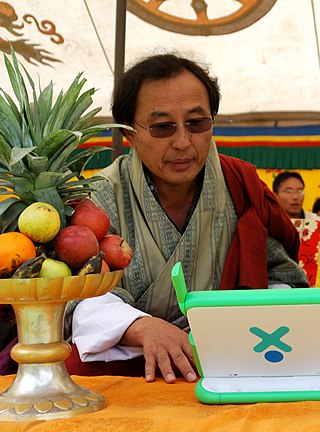
Dasho Kinley Dorji was Bhutan's first trained journalist who became founder, then managing director and editor in chief of Kuensel, Bhutan's national newspaper. In 2009 he became Secretary of the Ministry of Information and Communications, a position he held until 2016.
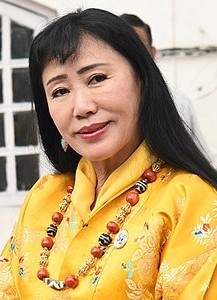
Queen Mother Dorji Wangmo is the Queen Mother of Bhutan, and first wife of former King Jigme Singye Wangchuck, who is married to four sisters all of whom were entitled to be called queen.
The Royal Order of Bhutan is a medal awarded by the King of Bhutan. It was established by Jigme Dorji Wangchuck in 1966 and redesigned in 2008.

Jetsun Pema is the Druk Gyaltsuen of Bhutan, as the wife of King Jigme Khesar Namgyel Wangchuck. She is currently the youngest queen consort in the world. She and the King have three children: Jigme Namgyel, the heir apparent to the Bhutanese throne, Jigme Ugyen, and Sonam Yangden.
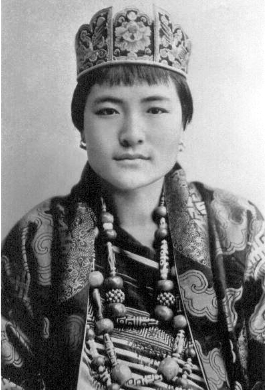
Ashi Phuntsho Choden (1911–2003) was the Queen consort of Bhutan.
Ashi Tashi Chodzom Dorji is a much-loved figure in Bhutan, having played a significant role in modern history, international relations and cultural life.
The Bhutan Media Foundation is a Civil Society Organisation (CSO) established under Royal Charter and with seed funding from His Majesty King Jigme Khesar Namgyel Wangchuck, in Thimphu on 21 February 2010. The charter was collectively written by media professionals. An editorial in Bhutan Today, described the CSO as "a beacon of hope" in developing a professional media industry.













